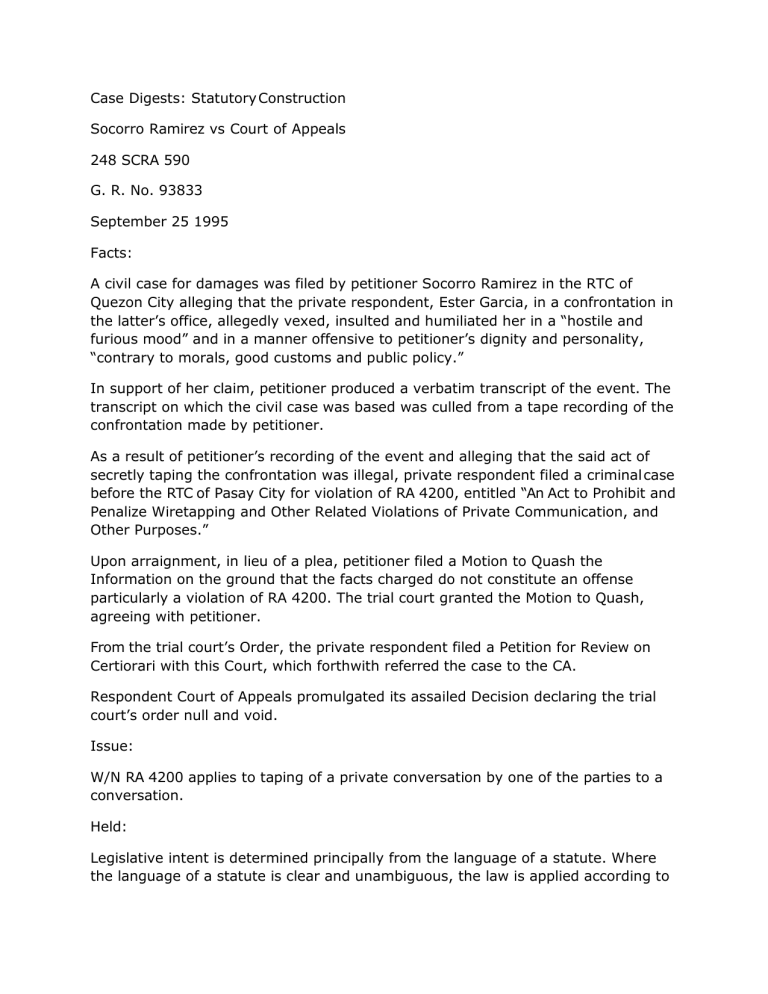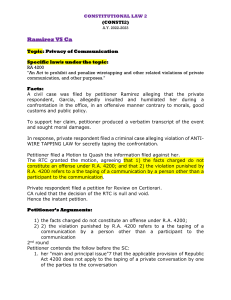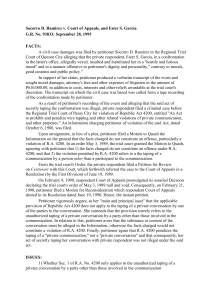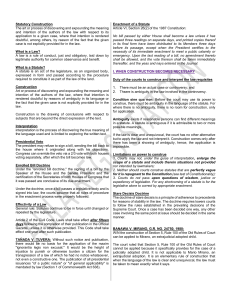
Case Digests: Statutory Construction Socorro Ramirez vs Court of Appeals 248 SCRA 590 G. R. No. 93833 September 25 1995 Facts: A civil case for damages was filed by petitioner Socorro Ramirez in the RTC of Quezon City alleging that the private respondent, Ester Garcia, in a confrontation in the latter’s office, allegedly vexed, insulted and humiliated her in a “hostile and furious mood” and in a manner offensive to petitioner’s dignity and personality, “contrary to morals, good customs and public policy.” In support of her claim, petitioner produced a verbatim transcript of the event. The transcript on which the civil case was based was culled from a tape recording of the confrontation made by petitioner. As a result of petitioner’s recording of the event and alleging that the said act of secretly taping the confrontation was illegal, private respondent filed a criminal case before the RTC of Pasay City for violation of RA 4200, entitled “An Act to Prohibit and Penalize Wiretapping and Other Related Violations of Private Communication, and Other Purposes.” Upon arraignment, in lieu of a plea, petitioner filed a Motion to Quash the Information on the ground that the facts charged do not constitute an offense particularly a violation of RA 4200. The trial court granted the Motion to Quash, agreeing with petitioner. From the trial court’s Order, the private respondent filed a Petition for Review on Certiorari with this Court, which forthwith referred the case to the CA. Respondent Court of Appeals promulgated its assailed Decision declaring the trial court’s order null and void. Issue: W/N RA 4200 applies to taping of a private conversation by one of the parties to a conversation. Held: Legislative intent is determined principally from the language of a statute. Where the language of a statute is clear and unambiguous, the law is applied according to its express terms, and interpretation would be resorted to only where a literal interpretation would be either impossible or absurd or would lead to an injustice. Section 1 of RA 4200 clearly and unequivocally makes it illegal for any person, not authorized by all parties to any private communication, to secretly record such communication by means of a tape recorder. The law makes no distinction as to whether the party sought to be penalized by the statute ought to be a party other than or different from those involved in the private communication. The statute’s intent to penalize all persons unauthorized to make such recording is underscored by the use of qualifier “any.” Consequently, as respondent CA correctly concluded, “even a (person) privy to a communication who records his private conversation with another without the knowledge of the latter (will) qualify as a violator under this provision of RA 4200. The unambiguity of the express words of the provision therefore plainly supports the view held by the respondent court that the provision seeks to penalize even those privy to the private communications. Where the law makes no distinctions, one does not distinguish. Stat Con Principle: Legislative intent is determined principally from the language of the statute. Legal Maxims: Verba Legis (the statute must be interpreted literally if the language of the statute is plain and free from ambiguity)


